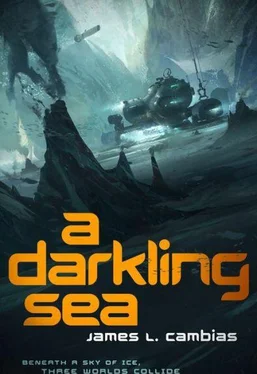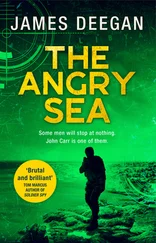It was a Sholen, all right. Lying on the bottom, with its limbs held in a very weird position. The front two limb pairs were held against its back, and the rear pair were parallel to the tail. The Sholen was hog-tied. It was a prisoner.
Why the hell were the Sholen tying each other up in the middle of a battle? Was this part of their constant sex thing?
It would be really easy for the drone to stab this Sholen in the throat, just below the helmet ring, and let it drown on blood and seawater. Rob thought about that, then maneuvered the drone to a position behind the Sholen. If whoever was in command of this attack felt it necessary to tie someone up, it seemed obvious to Rob that cutting the cables binding him would be a good thing.
Tizhos felt something prodding at her hands. Some kind of native organism? She stopped wriggling. Maybe it would crawl around to where she could get a look at it. She felt the cable binding her upper arms snap. The creature had freed her? She reached for her multipurpose tool and cut the cables on her midlimbs and legs, then turned to look at her rescuer.
It was a drone. Human-built, with a crude blade affixed to its nose. Why had it freed her?
No time. Her speaker was broken, so she shouted as loudly as she could, hoping the sound would carry through her hood and the water, “Get everyone away from the house! Irona wishes to kill you all! He has torpedoes! Very large! Get away!”
Tizhos didn’t wait for an answer, even if the human controlling the drone had understood her at all. She scrambled across the sea bottom toward the two torpedoes. Her arm and midlimb joints were stiff and painful, and her suit’s medical system was completely out of painkillers. She called for a big dose of stimulants and some confidence-building pheromones to help her tough it out.
The torpedoes hadn’t moved. She tried to establish a link, but Irona had prudently locked her out of the command web. Well, if high-tech methods wouldn’t work, perhaps primitive methods would. Tizhos made her tool narrow and sharp, and began jabbing at the control panel of the torpedo. She smashed sensors, indicators—anything that looked vulnerable. The tough plastic resisted her blows, but she got the blade into a seam and pried with all her strength until she heard a satisfying snap. Behind the panel was a block of circuitry sealed in plastic. Tizhos began stabbing it, holding the tool in both midlimb hands and using her whole body to drive it. Her suit reeked of aggression, and she found it oddly pleasant.
She ripped out the fragments of circuitry and groped inside for anything else she could ruin. She slashed what seemed like a hydraulic line and saw a cloud of fluid leak into the ocean like blood.
Enough damage. Time to move on. She clambered over to the second torpedo and made ready to stab its controls. Suddenly it began making a loud hum, and rose up off the bottom.
Tizhos got on top of it, trying to weigh it down, but it surged forward, then rolled, slamming her into the silt. When she looked up again it was ten meters away, rising and accelerating. She struggled after it, but the machine moved smoothly away.
Half a minute later there was a flash and a concussion that tumbled Tizhos head over tail along the sea bottom for a dozen meters.
She steadied herself, waited for her suit’s sonar and inertial navigation systems to recover, and wondered what to do next. Irona had won the battle; that much seemed obvious. Even if any of the humans and their native allies had survived, the Guardians would be able to round them up without any difficulty.
Tizhos realized, rather vaguely, that she herself might not survive very long. Would Irona even bother to take her back to Shalina for treatment of her behavior? Or would they just stuff her body into the plasma furnace along with the dead humans and let her ashes discolor Ilmatar’s surface for a few centuries?
When a Guardian found her, Tizhos followed her to the shattered settlement where Irona and the others were searching through the rubble. The water was still full of sediment, so it was like walking in heavy fog.
The elevator capsule lay on its side, caved in and flooded. The front of the native house had collapsed. Tizhos saw at least four Ilmataran bodies left scattered by the blast. She couldn’t tell if they were some of Irona’s native allies or the ones helping the humans.
“You failed,” said Irona when he noticed Tizhos. “We need only gather up the human artifacts and any native rec ords here, then we return to the base and finish dismantling it.”
“I intend to bear witness to this crime,” said Tizhos. “I shall inform the Consensus what you have done here. Tell me if you will order your Guardians to murder me also; I desire to know.”
“I see no more need for violence here,” said Irona, and even without smelling him Tizhos could tell he was afraid. “This world seems safe now. After we take you back home for treatment, I plan to lead expeditions against all the other human bases and colonies. I hope we do not need to kill any others.”
Tizhos made no reply. She sat amid the rubble as the others continued their search. After a long swim from the base and a battle, the Guardians looked exhausted. Finally even Irona noticed and called a rest. “Two hours for rest and food, then we resume work.”
The Guardians gathered at the torpedo impact point, where the force of the blast had cleared away rubbish and left a nice open area. They dropped to the sea bottom and lay as limp as sleeping humans.
Irona came over to Tizhos and sat. “I want you to promise me you do not intend to run away. Otherwise I must tie your limbs again.”
“I have no place to run to,” she said. “I suggest you return to the base and allow the Guardians to rest and recover. You can bring a work party to clear away all the human artifacts later.”
“Scavengers may come before we can remove everything. I believe it best to get everything now.”
“Tell me what you plan to do with it all.”
“The incinerator on the surface can dispose of everything. After it reduces everything to ash, we will dismantle it and take away the pieces. No trace of any alien presence will remain on this world.”
“You could save the native rec ords. They have little mass, and would improve our knowledge of this civilization.”
“No,” said Irona. “They would only tempt you and others who think the same way. You would wish to learn more. Only probes at first, but then would come crewed missions. Where the explorers go, conquerors and exploiters always follow. We can only avoid moral fault by remaining at home, on our own world in our own communities.”
Tizhos couldn’t answer that; she could smell her own sadness and depression. The idea of returning to Shalina and living in a Consensus that thought the way Irona did made her want to die.
Perhaps she could accompany the human prisoners back to Earth. Assuming, of course, that Irona really intended to send them home.
“Tell me what will happen to the prisoners,” said Tizhos.
Irona didn’t reply. Tizhos looked at him and saw that Irona was staring at a swirl of dark material in the water. After a moment Tizhos realized that the dark stuff was coming from a hole in Irona’s suit, just below the helmet. There was some kind of pointed object studded with little barbs sticking out of the hole. As Tizhos watched, the tapered object slid back into the hole and then Irona fell over sideways in a cloud of blood and bubbles.
An Ilmataran was standing behind Irona, cleaning blood off one pincer with its feeding tendrils. Then it advanced on Tizhos.
“I surrender! I will not fight!” She bowed her head and held her front arms straight out from her body in the traditional pose of surrender, then realized that looked an awful lot like the Ilmataran threat posture. So she tucked in her arms and tried to curl into a ball.
Читать дальше












